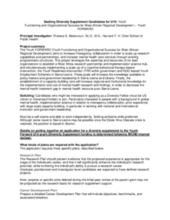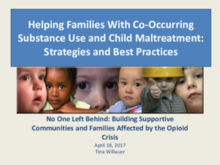Displaying 1701 - 1710 of 2221
This special issue focuses on the much larger number of kinship caregivers, who either intervene on their own or accept the assistance of child protective authorities that facilitate informal arrangements without taking legal custody.
This two-part special issue of the Child Welfare Journal focuses on children in kinship care—those who are being raised by grandparents, aunts and uncles, older siblings, and non-related extended family members—to bring attention to this less visible area of public child welfare, featuring policy-based and empirical research on kinship families.
This study explored the experiences of adoptive parents who chose to place their intercountry adopted child in out-of-home care due to the child's disability.
This study seeks to contribute to the literature on child welfare and parental drug use in the United States by answering several research questions.
Catholic Relief Services is seeking a Technical Advisor to work in its Baltimore, United States' office.
Background
Project summary: The Youth FORWARD (Youth Functioning and Organizational Success for West African Regional Development) aims to increase interagency collaboration to scale up research capabilities and partnerships, and increase me
This presentation features:
The purpose of this article is to provide a summary of the published research addressing the challenges and strengths of Latino grandparents raising grandchildren in the United States.
This study examines signs of reactive attachment disorder and disinhibited social engagement disorder at age 12 years in 111 children who were abandoned at or shortly after birth and subsequently randomized to care as usual or to high-quality foster care, as well as in 50 comparison children who were never institutionalized.
The Society for Research in Child Development (SRCD) is inviting submissions for the 2017 Biennial Meeting to be held April 6 - 8, 2017 at the Austin Convention Center and the Hilton Austin Hotel in Austin, Texas, USA.


